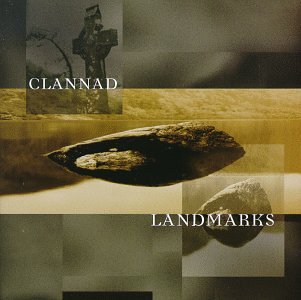 I always think of Clannad as an Irish traditional group, which they aren’t — at least, not any more. Traditionally grounded, yes, as one can see from their early recordings, but what has become their signature style incorporates bits of everything from jazz to rock to pop and wanders rather easily into the “New Age” category (if one can call anything that includes Clannad, Robert Rich, Tangerine Dream and Cusco a “category”). And after listening to Landmarks, it’s easy to see why they fit into the “New Age” framework, or at least a section of it.
I always think of Clannad as an Irish traditional group, which they aren’t — at least, not any more. Traditionally grounded, yes, as one can see from their early recordings, but what has become their signature style incorporates bits of everything from jazz to rock to pop and wanders rather easily into the “New Age” category (if one can call anything that includes Clannad, Robert Rich, Tangerine Dream and Cusco a “category”). And after listening to Landmarks, it’s easy to see why they fit into the “New Age” framework, or at least a section of it.
The tone for this collection is pretty much set with the first track, “An Gleann.” The only word to describe the soundscape is “lush.” The vocals, by Máire Brennan and Ciarán Brennan, are in Irish (as are the two following tracks, although the bulk of the album is in English); the instrumentals are so thoroughly blended that little stands out except occasional keyboard accents (both acoustic and electronic) and Anto Drennan’s slide guitar. “Fadó” moves into territory a bit more melancholy, signaled by the whistle accompaniment, provided by Ian Melrose, and then the mood picks up with “A Mhuirnín Ó,” an up-tempo number with, again, that blended soundscape over a rapid, world-beat rhythm.
The switch to English in “Of This Land” sends the mood back to the melancholy side — it’s another seamless blend that produces a very rich and seductive sound, which carries through into “Court To Love.” Oddly enough, the instrumental “The Golden Ball” loses a bit of the magic — it starts off as a sprightly tune with soprano sax (Mel Collins),whistle (Vinnie Kilduff), acoustic guitar (Ian Melrose), and piano and keyboards (Ian Parker), but aside from one slow break in the middle, there’s little to differentiate it from something you might hear over the sound system in a mall. “The Bridge of Tears” more or less describes itself: Máire Brennan’s voice here takes on an added poignancy, which carries over at least into the first part of “Autumn Leaves Are Falling,” a song in which the jazz influence is very strong. The initial mood is re-established with “Let Me See,” which comes back to the kind of ethereal sound with which the group seems most comfortable. And the mood continues through the final instrumental “Loch Na Callaé.”
A big part of Clannad’s impact is Máire Brennan’s voice, which is arguably one of the greats, although in this album she doesn’t display the range that designation would imply. That said, there’s no denying that her vocals carry a great deal of the emotional color in these songs.
I know I’ve stressed “mood” throughout this exploration of Landmarks, mostly because that’s a signal feature of the album, and something that I suspect makes it very easy to typify Clannad as “New Age” — in fact, there are those who credit them with defining the genre (but see my note above about “categories”). Nevertheless, Clannad’s music is considered very influential on a number of groups and as a marker in the development of so-called “Celtic” music.
All things considered, Landmarks is certainly easy to listen to and engaging on several levels. If I have any objection, it’s that the music stops short — it doesn’t really reach out and grab you the way I think it could, perhaps a function of the group’s accent on the spiritual rather than the visceral. It’s as though everything was smoothed out — there’s no bite.
Clannad’s Web site is here, where you can find a history of the group, a discography, and information on tours.
(Atlantic Records, 1997)
